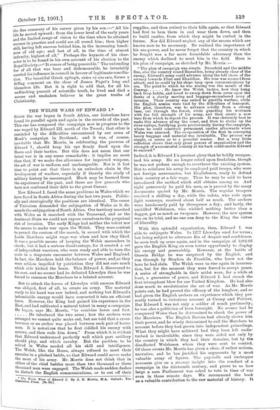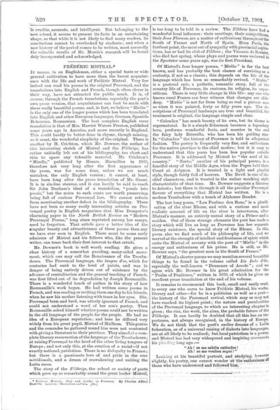THE WELSH WARS OF EDWARD I.*
SINCE the war began in South Africa, our historians have found its parallel again and again in the records of the past. This one has compared the campaign now in progress to the war waged by Edward III. north of the Tweed; that other is reminded by the difficulties encountered by our arms of Monk's campaign in Scotland; and it was, of course, inevitable that Mr. Morris, in celebrating the prowess of Edward T., should keep his eye firmly fixed upon the Boers and their tactics. But this does not mean that our latest war is in any sense remarkable : it implies no more than that, if we make due allowance for improved weapons, the art of war is uniform and unchangeable. Nor is it lost time to point out that there is an unbroken chain in the development of warfare, especially if thereby the study of military history be encouraged. Much may be learned from the experience of the past, and there are few generals who have not confessed their debt to the great Caesar.
Now Edward L faced the same problems in Wales which we have faced in South Africa during the last two years. Politic- ally and strategically the positions are identical The cause of Unionism demanded the subjugation of Wales as it de- mands the subjugation of South Africa. Our territory marched with Wales as it marched with the Transvaal, and as the dominant State we could not expose ourselves to the perpetual risk of invasion. The early Kings had neither the talent nor the means to make war upon the Welsh. They were content to permit the custom of the march, in accord with which the Lords Marchers might wage war when and how they liked. It was a possible means of keeping the Welsh marauders in check; but it had a serious disadvantage, for it created a set of independent warriors, who were ready and able to turn the scale in a desperate encounter between Wales and England. In fact, the Marchers held the balance of power, and as they were seldom impelled by patriotism they did not care much which side kicked the beam. This Edward I. discovered to his cost, and no sooner had he defeated Llewelyn than he was forced to summon the Marchers to a belated account.
But to attack the forces of Llewelyn with success Edward was obliged, first of all, to create an army. The material ready to his hand was raw indeed, and nothing but Edward's indomitable energy would have converted it into an efficient force. However, the King had gained his experience in the East, and had cultivated a natural talent in many a campaign. He began, says Mr. Morris, " to combine horse and foot. ..... He interlaced the two arms ; how the archers were arranged we cannot quite make out, but are told that a cross- bowman or an archer was placed between each pair of horse- men. It is notorious that he first riddled his enemy with arrows, and then rode him down." From which it is evident that Edward understood perfectly well which part artillery should play, and which cavalry. But the problem to be solved in Wales needed all his skill and intelligence. The Welsh, like the Boers, always refused to meet their enemies in a pitched battle, so that Edward could never make the most of his army. Mr. Morris does not think that in either of the chief battles more than two thousand or three thousand men were engaged. The Welsh made sudden dashes to disturb the English communications, or to cut off their
• The Welsh Wars of Edward I. By J. E. Morris, M.A. Oxford: The Clarendon Prem. [Si. 6d.1
supplies, and then retired to their hills again, so that Edward had first to hem them in and wear them down, and then to build castles, from which they might be curbed in the future. Nor did Edward neglect any of the means which are known now to be necessary. He realised the importance of his sea-power, and he never forgot that the country in which he fought was a far more formidable adversary than the enemy which declined to meet him in the field. Here is his plan of campaign, as sketched by Mr. Morris :—
"The plan of campaign was simple. Bromfield and the middle Dee, also the country round Hawarden, being already clear of the enemy, Edward's army could advance along the left shore of the estuary towards Flint and Rhuddlan. His rear was secured from attack, and he could by his ships keep open communications by sea. The point to which he was aiming was the mouth of the
Conway He knew the Welsh tactics, how they hung back from battle, and loved to swoop down from cover upon the flanks of a slowly moving and baggage-encumbered army of invasion. Their country was suited to guerilla warfare, while the English armies were tied by the difficulties of transport. His plan, therefore, was to advance solidly from a strong base, cut through the forest, while guarding his workmen with the full strength of his army, and then create a new base from which to repeat the process. It was obviously best to make this advance along the coast, and then to strike up the river-valleys, fortifying posts provisionally during the campaign, where he could construct permanent castles afterwards when Wales was annexed. The co-operation of the fleet in conveying heavy baggage and material was invaluable. The process was simple, or seems so to a peaceful reader. But a very little reflection shows that only great powers of organisation and the strength of a resourceful country at his back could enable Edward to succeed."
Indeed, it is Edward I.'s greatest glory that he boldly reorgan- ised his army. He no longer relied upon feudalism, though he was not pedant enough to overthrow the existing system.
But to reinforce his army he employed paid troops, who were not foreign mercenaries, but Englishmen, ready to defend their country at a fair wage. Thus he may be said to have introduced the method which still obtains among us. And right generously he paid his men, as is proved by the many
documents quoted by Mr. Morris. The regular troopers received a shilling a day, while the valets, who rode upon light rounseys, received about half as much. The archers were handsomely paid by threepence a day; and lastly, the unskilled Welshmen, who wielded nothing better than a dagger, got as much as twopence. However, the new system was on its trial, and no one can deny to the King the virtue
of liberality.
With this splendid organisation, then, Edward I. was able to subjugate Wales. In 1277 Llewelyn sued for terms ; but being subject to alternate fits of despair and confidence, he soon took up arms again, and in the campaign of 1282-83 gave the English King an even better opportunity to display his energy and generalship. However, at the battle of Orewin Bridge he was surprised by the English, and run through by Stephen de Franklin, who knew not the hero he had slain. The Welsh were to rise again in insurrec- tion, but for the moment they were forced to accept peace.
A series of strongholds in their midst were, for a while at least, a guarantee of peace, and Edward I. had struck the first triumphant blow for our United Kingdom. He had also done much to revolutionise the art of war. As Mr. Morris points out, he had proved the efficacy of the longbow, and so had given the English archers an experience which they pre- sently turned to victorious account at Cressy and Poitiers,
But Edward I. was not only a soldier of much pertinacity ;
he was also a politician of keen foresight. No sooner had he conquered Wales than he determined to check the power of the Marchers. The English Barons had already shoWn him their power, and he wisely determined to call the Marchers to account before they had grown into independent princelings.
What they might have achieved had they been left undis- turbed is incalculable, since they were aided not only by the country in which they had their domains, but by the disaffected Welshmen whom they were sent to control Of these events Mr. Morris has given a clear, if rather serious, narrative, and he has justified his arguments by a most valuable array of figures. The pay-rolls and exchequer accounts give us a strange insight into the conduct of a
campaign in the thirteenth century, and prove to us how large a sum Parliament was asked to vote in time of war even in those remote days. We recommend the book as a valuable contribution to the raw material of history. It
is erudite, accurate, and intelligent. But belonging to the .new school, it scorns to present its feats in an entertaining shape, so that while it is not likely to find many readers, its conclusions cannot be overlooked by students ; and when a new history of the period Comes to be written, most assuredly the valuable results of Mr. Morris's research will be found duly incorporated and acknowledged.















































 Previous page
Previous page